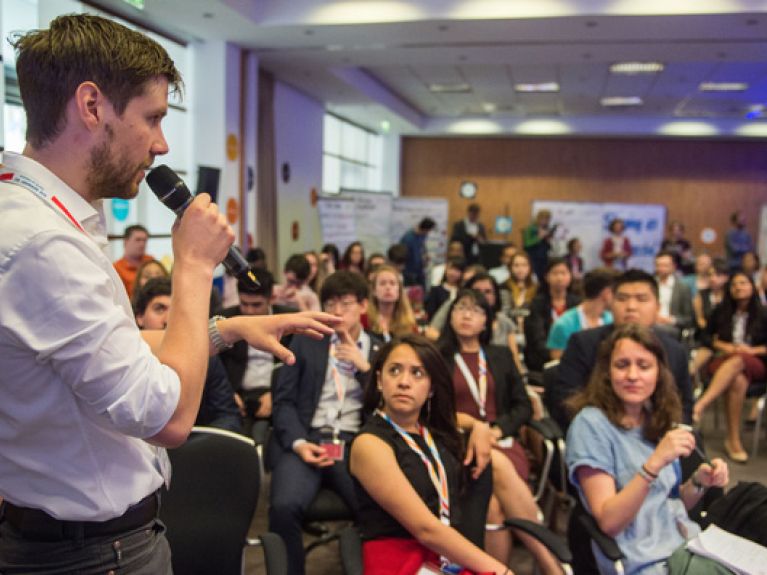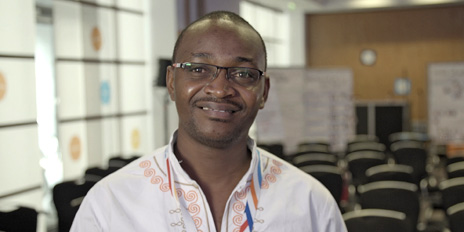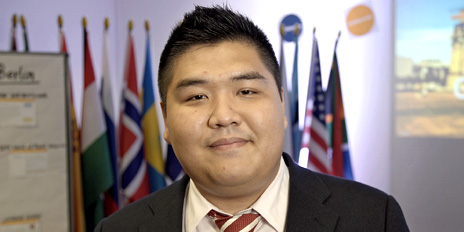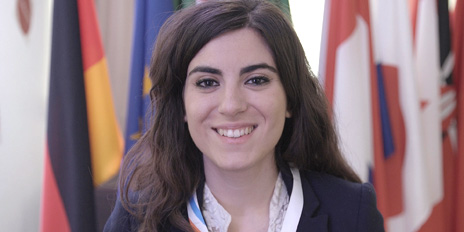“Climate First” – young people have their say
Before the G20 summit: at the Youth20 Dialogue in Berlin, young people from all over the world agree common positions on global issues – including critical exaggerations.

A hotel in Berlin Mitte, the district in the centre of the German capital. Voices are buzzing in the foyer. Sixty-eight young people are huddled together in small groups, talking in different languages. They have travelled here from 31 countries at the invitation of the Federal Government to take part in the Youth20 Dialogue (Y20). In the course of a one-week youth forum they formulated positions on global issues which they then presented to the Federal Chancellor on 7 June 2017 in the run-up to the G20 summit in Hamburg. They are the same issues that the heads of state and government of the leading industrialised nations and emerging countries will discuss in July 2017: How can we protect our planet? How can we increase global fairness? How can we empower women?
The G20 countries represent almost two thirds of the global population and three quarters of world trade. That’s why their decisions carry special weight, particularly for young people’s future. Y20 is their chance to have a say in the forum of the G20 decision-makers.
Patrick Ochiba from Kenya
Although I’m still studying for a Master’s degree in literature, I already work as a teacher too. As a member of Pax Romana, the international movement of Catholic students, I actively work for social justice and environmental protection. When it comes to questions about the environment and climate, we are guided by Laudato Si, Pope Francis’s encyclical. One of the core messages of the encyclical is that the struggles against environmental destruction and against poverty belong together.
Many young people do not want to become involved in social action. Some time ago I realised that empty rhetoric – for example, in politics – put them off. That’s why I considered ways of motivating them – and then founded a theatre group for young people in Kakamega, my home town in western Kenya. We now stage plays there about important social issues.
Here in Berlin I belong to a working group that is focusing on the subjects of climate and energy. I am proud that I have been able to contribute my views and my personal experiences from Kenya to the discussion. In the working group we eventually emphasised our position by choosing the title “Climate First” to make clear how important climate protection is. Of course, that is also a response to a slogan from the country that has withdrawn from the Paris climate agreement.

A short lunch break during the tight conference schedule. The participants have just had a discussion with Steffen Seibert, the German government spokesperson, and are about to visit various non-governmental organisations. The Y20 participants have only two things in common: their age – all of them are between 18 and 30 – and their community involvement. Besides this they are as different as you would expect people to be who come from 31 countries and have different jobs, interests and socio-economic backgrounds.
Tan Pengru from Singapore
I am here as a representative of the Youth Committee of Asia-Pacific Economic Cooperation (APEC). Although I come from Singapore, I live in Tokyo, where I am doing research for my doctoral thesis on territorial conflicts, above all in the China Sea. That is a controversial subject. The big question is how to address the interests of many countries in such a way that the conflicts do not explode.
We are also confronted with a similar challenge here at Y20: every participant arrives with a different perspective and different interests, but nevertheless we want to attempt to reach a consensus. We are united by the fact that we want to be heard as the representatives of young people. After all, decisions at the G20 summit are about our future.

The meeting is drawing to a close. It is the day before the participants present their position paper to the Federal Chancellor. One group goes into closed session to prepare for the presentation. The conference has been very exhausting; that is evident from the young people’s appearance. Some positions – for example, on a women’s quota – involved hefty struggles. In the position paper, the participants eventually called for: “Establishing systems, for example, quotas, for leadership positions in public administrations and large private and public companies in order to create space for women’s political and economic participation.”
The 36-page document contains numerous recommendations on 11 of the 15 topics that the G20 summit will be covering. On the subject of migration, for example, Y20 participants call on the G20 leaders and responsible institutions to: “Create legal channels for asylum-seekers to ensure a safe passage and the right to asylum, for example, at embassies or consulates.”
Clara Latini from Italy
I graduated in politics and southeast European studies at the University of Regensburg. I have also lived in Serbia and Croatia. Since 2016 I have been working at the Italian Chamber of Commerce in Budapest, Hungary.
Initially, when I arrived in Berlin for the Y20, I didn’t know which topic I should choose. I was interested in the subject of migration, because I worked in Amnesty International for many years and am also a migrant myself. But then I opted for the empowerment of women, because there is so much in our society that annoys me in that respect. That’s also why I recently founded a platform that networks young women.
My most important demands in the debate here in Berlin were: increasing the number of women in leadership positions and in STEM occupations – in other words, in the fields of science, technology, engineering and mathematics – and better childcare systems so that women do not have to choose between having children or a career.
I do believe that Angela Merkel will take note of our position papers. She is a role model with regard to the empowerment of women: she comes from a STEM subject, namely chemistry, and she has held a very powerful position for many years.
I learned a great deal here in Berlin – above all, about teamwork and diplomacy. Our different backgrounds made it rather difficult to reach a compromise on some topics. But that is how it is in real life and also at the G20 summit.


